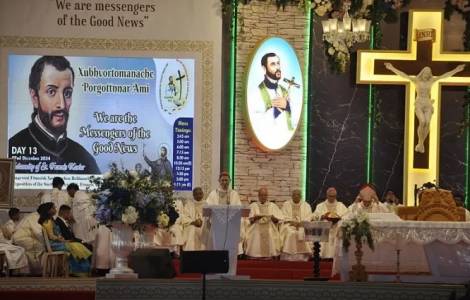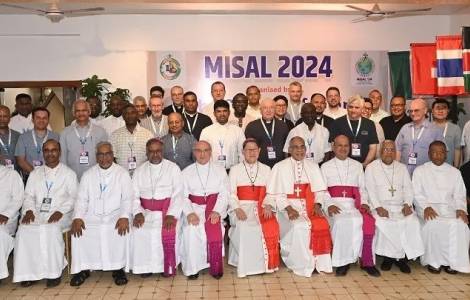
Mangalorean.com
Goa (Agenzia Fides) - "Authentic messengers rejoice that they are not the only ones called by Jesus, so they have companions, not competitors, on the journey". These words of Cardinal Luis Antonio Gokim Tagle, Pro-Prefect of the Dicastery for Evangelization, resounded in the Cathedral of Goa during the solemn Mass celebrated in honor of St. Francis Xavier, Patron of Catholic missions, whose feast is commemorated today. For more than a week, the Cathedral has been hosting the ostentation of the remains of the great Jesuit missionary.
The event, which is repeated every ten years, is characterized by a solemn procession with the remains of the Saint (which normally rest in a silver casket kept in the ancient Basilica of Bom Jesus), transferred to the Cathedral of Goa.
During his homily, Cardinal Tagle stressed that “the exposition of his sacred relics adds significance to the celebration this year of the great saint. St. Francis Xavier “in the flesh” seems to be reminding us now: We are messengers of the Good News”. And it is precisely on these two terms – messengers and Good News – that the Pro-Prefect of the Missionary Dicastery dwelt on his homily.
"In our daily ordinary life, a messenger is one who delivers a message or runs an errand for a superior or for someone who hired him/her for the job. In the Bible the angels, prophets and apostles are shining examples of God’s messengers". Jesus himself, the Cardinal pointed out, "is the supreme messenger of the Father".
All biblical messengers, the Cardinal continued, taking the Prophet Jeremiah and the Apostle Paul as examples, "are called to deliver God’s message to others, to the nations". For them "everything begins with God’s gracious call". Jeremiah "was overwhelmed by God’s call and even protested, invoking his youthfulness as a limitation. He did not say: Thanks for choosing me and not the other young people around here. I am really the best. Even St. Paul admitted that he was the very least of all the holy ones for he used to persecute the Church, yet he was still called”.
“The messengers called by God”, the Cardinal pointed out “see their littleness before the grandeur of the Lord who calls and the magnitude of the mission”. They “do not present, promote or advertise themselves, nor do they find a way to be chosen; nor do they create their own message. Authentic messengers are surprised that they have been noticed by God and entrusted with a divine task. Authentic messengers remain humble by keeping a simple lifestyle and a meek attitude. Authentic messengers face rejection, threats and persecution “as doves, not as wolves, because they depend on God’s goodness and on the power of God’s word. Authentic messengers rejoice that they are not the only ones called by Jesus, so they have companions, not competitors, on the journey”.
However, in the history of the world, Tagle pointed out, “even to our time, we have witnessed the existence of false messengers. They pretend to be gods, bringing disaster to society. They are called and sent by the false gods of superiority, ambition, greed, discrimination, injustice, indifference and violence.”
The Pro-Prefect of the Dicastery for Evangelization, moving on to describe what the Good News is, the second reality at the center of his reflection, once again quoted St. Paul, according to whom “the Good News is the mystery of Christ, ‘which was not made known to human beings in other generations as it has now been revealed to his holy apostles and prophets by the Spirit, that the Gentiles are coheirs, members of the same body, and co-partners in the promise in Christ Jesus through the gospel’.” The Good News, therefore, “is that God offers His Kingdom through Jesus and in the Holy Spirit. Where God reigns in Jesus, the walls and barriers separating people from each other will be torn down. Those who allow Jesus to rule their hearts will regard each other not as strangers, threats and enemies but as brothers and sisters.”
The Good News, Cardinal Tagle stressed, “is not an empty promise, an unreachable dream. The Good News is Jesus” who today “calls us to be His messengers.” And to be so, Tagle invites us to look to Saint Francis Xavier “as an inspiration and model.” “At first,” recalled the Pro-Prefect of the Missionary Dicastery, “Francis Xavier was skeptical about Ignatius of Loyola and his vision,” but then “he became one of the first companions of Ignatius and co-founders of the Society of Jesus. He was not the first choice of Ignatius to go to the East Indies. But when the original plan did not materialize, Ignatius reluctantly allowed Francis to take over.” Moreover, “God can call second and accidental choices.”
When Francis Xavier arrived in Asia, “he proclaimed the Gospel with zeal amidst difficulties. In all his missionary travels and activities he brought only the essential books for prayer, catechism and the devout life. It was neither ambition nor conquest that gave him energy Just love, that is all that mattered. The message emboldened the messenger. The messenger embodied the message,” Cardinal Tagle concluded.
On the eve of the feast of St. Francis de Sales, the Pro-Prefect of the Dicastery for Evangelization participated in the inauguration of the Meeting of the International Societies of Apostolic Life (MISAL) in Pilar (see photo), an event that takes place every two years and which this year is hosted by the Missionary Society of St. Francis Xavier, also known as the Society of Pilar, founded in Goa in 1887 by Father Bento Martins.
Delegates from all over the world, representing 29 Institutes of Apostolic Life, are taking part in the event, which will take place until 6 December 2024 and whose motto is "Walking together: meeting new frontiers".
In his speech, Cardinal Tagle spoke about the concept of "frontier" in relation to evangelization. Frontier, he said, is not only "a physical border" but is often also "a set of civil, historical, cultural and ethnic dimensions". For the Pro-Prefect of the Dicastery for Evangelization, it is "necessary to be aware of these frontiers" in order to give an "authentic testimony of the universal frontiers of Christian love". (Agenzia Fides, 3/12/2024)
